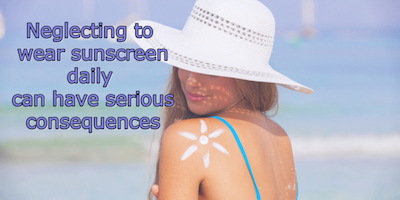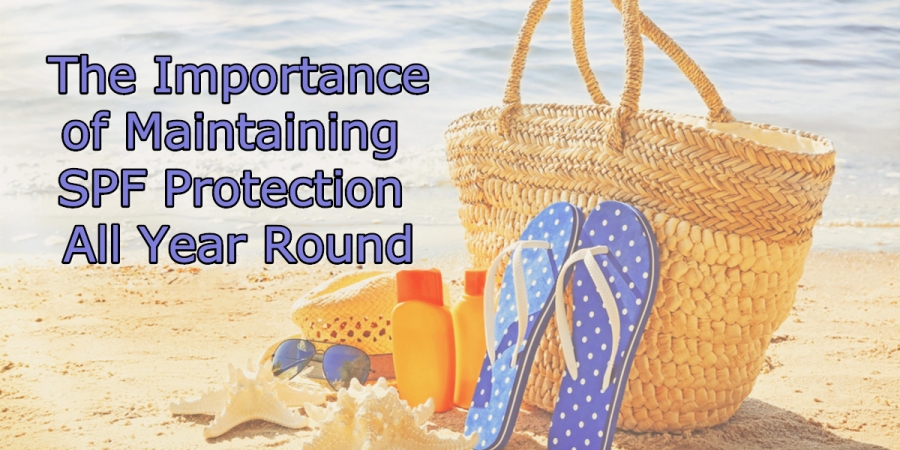Neglecting to wear daily sunscreen can have serious consequences like causing premature aging in the form of fine lines, wrinkles, and age spots.
The difference cannot be seen immediately, but over time, studies show that those who use sunscreen daily often appear visibly younger than their counterparts who only used sunscreen when they felt like it.
What are the signs of photoaging?
Here is another surprising fact. According to the Canadian Dermatology Association, UV exposure contributes to up to 90% of the visible signs of aging. The most common signs of sun-damaged skin are:
-
Fine lines and wrinkles that become creases
-
Spider veins on the face and neck
-
Hyperpigmentation/liver spots
-
Lips that lose fullness and color
-
Loss of skin tone
-
Leathery and sagging skin
-
Actinic keratosis- rough scaly spots that can be pre-cancerous
If the simple application of sunscreen can prevent all of these unwanted effects, isn't it time to make a commitment to wearing sunscreen daily and reapply this protective measure throughout the day?
What is the difference between UVA and UVB rays?
-
UVA rays cause wrinkles that contribute to premature aging. These rays go deeper than UVB rays, reaching the dermis. These rays damage the collagen and elastin that keep your skin supple and youthful. They also can harm blood vessels beneath the surface.
-
UVB rays are responsible for those bothersome sunburns. When they burn your epidermis, they damage your skin's DNA which not only causes signs of aging but can lead to skin cancer.
What if I don't go outside?
If you don't have laminated windows with full spectrum UV protection, though UVB rays are blocked by ordinary glass, about 75% of UVA rays from outside still get inside your house.
Therefore, even if you are staying at home for the day, you should put on your daily sunscreen for maximum anti-aging protection.
Am I safe from indoor lighting?
Not only should you be aware of the sun's damaging effects, but you should also protect your skin against certain kinds of indoor lights. Everyday electronics like tablets, computers, television, lamps and overhead lights emit blue rays which can also have an aging effect on the skin.
Therefore, even if you draw all your curtains shut or if it is night, if you are going to be around artificial light or electronics (hello, smartphone!) you still need to wear sunscreen.
What kind of sunscreen should I use?
Sunscreens made of physical-minerals like zinc oxide or titanium oxide are going to stop the rays, making them unable to penetrate the skin.
We do not recommend chemical sunscreens that contain avobenzone or oxybenzone because they merely convert the UVA and UVB rays into a different form of energy.
Another reason to go for physical minerals is that they block more UVA rays than the other kind of sunscreen. Since UVA rays are more destructive and responsible for the majority of the signs of aging, this is a strong advantage.
How much SPF is enough?
We recommend using a minimum of SPF 30. This kind of broad-spectrum sunscreen will protect you from both UVB and UVA rays. You can also get maximum protection by choosing a foundation or BB cream that also contains SPF protection.
Protect your lips as well with an SPF lip balm to keep them plump and youthful.
My skin is already sun damaged. What can I do?
If you are like many Canadians who have not been on board with regular sunscreen, you may have checked off a few of the UV ray side effects as you read the list at the beginning of this blog.
Relax and put yourself at ease because there are cosmetic treatments, skin care regimens, and a lifetime left to take care of your skin and make the most of what you have.
For fine lines, dermal fillers like Juvederm or Botox can help immensely. For minor problems like sun spots, regular exfoliation can reduce the appearance of hyperpigmentation. If your damage is dramatic, more intense chemical peel treatments can greatly improve the look of your skin.
A lifetime of skincare is ahead of you:
After you receive treatments and get your skin back to the best it can be, you need to make a commitment to wear zinc oxide sunscreen daily, that is at least SPF 30. Whether it is summer, winter, day, or night, either UVA, UVB, or blue light rays from electronics are a constant threat to your skin.
Protect your beauty and health for years to come by shielding your skin from the sun and harmful indoor lights. If you have any question

s about protecting your skin against the sun or any other questions regarding skin damage, contact us, book an appointment today.



